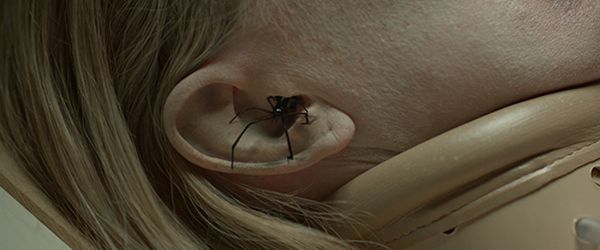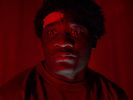Eye For Film >> Movies >> Cerebrum (2022) Film Review
Cerebrum
Reviewed by: Jennie Kermode

We still know very little about comas – why they happen and what goes on during them. What we do know points to the idea that they allow time for the brain to heal following traumatic damage which usually has a clear physical cause but can sometimes be wholly or partially psychiatric. When Will (Tobi King Bakare) wakes up in hospital, he’s dealing with elements of both. He has very little memory of the car crash which put him there. He’s been out for so long that his muscles have weakened and he finds it difficult to stay on his feet. He’s also unable to speak.
At a time like this, it might seem like quite an advantage to have a neurosurgeon for a father. This is Richard (Steve Oram), who takes him home with the help of a wheelchair, shows him into a room which he has set up downstairs in his spacious country home, and promises to look after him until he’s better. Relations between the two, however, immediately feel strained. Richard is loving but overbearing, frustrating Will’s attempts to regain some independence. He also seems resentful, perhaps more so than can be explained by the natural awkwardness between fathers and sons at that stage in life. Will wants to see his mother, but his father says she’s unwell and that it will have to wait. It sounds like an excuse.

Primarily a two-hander, Cerebrum is complicated by flashbacks and visions. Will suffers seizures and is uncertain about what is and isn’t real. He’s haunted by a dream of being tied up in the middle of the road. His father gives him a button for summoning his help, which emphasises the fact that he can’t call for help, that he’s dependent and vulnerable. Director Sébastien Blanc finds power in little moments. A beige plaster gently pressed onto Will’s dark skin marks out the difference between good intentions and real consideration. Richard’s shaving routine sees him applying a mask in more ways than one.
Oram is reliable as ever, making the most of the opportunity to explore a more complex character than he usually gets and move beyond the kind of work with which his fans will be familiar. Bakare, who came up through television, gives Will an emotional energy and intensity which keeps him from being overshadowed and neatly counterbalances his physical limitations. Will’s muteness gives him more ability to express his capabilities as an actor, rather than less. The real standout, however, is Ramona Von Pusch, whose brief scenes as Will’s mother hold the rest of the film together and establish the motivation of both main characters. The vitality, personality and love which she puts across within the space of juat a few minutes drives the action throughout.
As viewers may guess from the film’s inclusion in Frightfest 2022, there is a genre element lurking behind the drama here, with aspects of horror and science fiction. It’s lightly established, relying heavily on cinematic language which dates back to the Fifties, so as not to overwhelm the story, and it’s really present as an engine for generating ethical and philosophical questions. The film’s real strength is in its characters. Though it shifts its focus into something much darker towards the end, the meat of it is in the father-son relationship, in their interactions and the ways that they observe each other. In a key scene, Richard persuades Will to join him in an exercise which involves laughing at the things they find most distressing. The result is a deeply unsettling display which will stay with you.
The marriage of character-focused drama and science fiction doesn’t always work, and towards the end the former feels compromised a bit in order to fit into the demands of the latter. There’s a retreat into formula after Blanc has shown us that he’s capable of delivering something more unusual. Despite this, however, it’s an intriguing film with a sharp understanding of family dynamics, and it’s well worth checking out.
Reviewed on: 27 Aug 2022
















